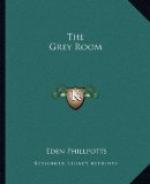“We, who have been nurtured at Eton and Oxford, remember enough Latin to understand these people,” he said, “for what is Italian but the emasculated tongue of ancient Rome?”
Nelly Travers committed herself to many utterances as idiotic as Ernest’s, and Mary secretly wondered to find how shadowy and ridiculous such solid people showed in a strange land. They carried their ignorance and their parochial atmosphere with them as openly and unashamedly as they carried their luggage. She was not sorry to leave them, for she and her father intended to stop for a while at Como before returning home again.
Their friends were going to motor over the battlefields of France presently, and both Ernest and Nelly came to see Sir Walter and his daughter off for Milan. Mr. Travers rushed to the door of the carriage and thrust in a newspaper as the train moved.
“I have secured a copy of last week’s ‘Field,’ Walter,” he said.
They passed over the Apennines on a night when the fire-flies flashed in every thicket under the starry gloom of a clear and moonless sky; and when the train stopped at little, silent stations the throb of nightingales fell upon their ears.
But circumstances prevented their visit to the Larian Lake, for at Milan letters awaited Sir Walter from home, and among them one that hastened his return. From a stranger it came, and chance willed that the writer, an Italian, had actually made the journey from Rome to London in order that he might see Sir Walter, while all the time the master of Chadlands happened to be within half a day’s travel. Now, the writer was still in London, and proposed to stop there until he should receive an answer to his communication. He wrote guardedly, and made one statement of extraordinary gravity. He was concerned with the mystery of the Grey Room, and believed that he might throw some light upon the melancholy incidents recorded concerning it.
Sir Walter hesitated for Mary’s sake, but was relieved when she suggested a prompt return.
“It would be folly to delay,” she said. “This means quite as much to me as to you, father, and I could not go to Como knowing there may be even the least gleam of light for us at home. Nothing can alter the past, but if it were possible to explain how and why— what an unutterable relief to us both!”
“Henry was to meet us at Menaggio.”
“He will be as thankful as we are if anything comes of this. He doesn’t leave England till Thursday, and can join us at Chadlands instead.”
“I only live to explain these things,” confessed her father. “I would give all that I have to discover reasons for the death of your dear husband. But there are terribly grave hints here. I can hardly imagine this man is justified in speaking of ‘crime.’ Would the word mean less to him than to us?”
“He writes perfect English. Whatever may be in store, we must face it hopefully. Such things do not happen by chance.”




